Below is all the testimony, in order, separated by speaker.
01 Representative Cale Keable, who represents Burrillville, introduced the bill.
02 Jeremy Bailey, Burrillville resident
03 Lenette F. Boisselle, representing the Northern RI Chamber of Commerce, opposes the bill. Earlier in the day, Loiselle was at the Kirkbrae Country Club for the Northern RI Chamber of Commerce breakfest. At that event, all the questions for guest speaker John Niland, director of development for Invenergy, the company that wants to build the power plant in Burrillville, were submitted in writing. It was Boiselle who carefully sorted the questions, allowing Niland to only answer softball questions.
Boiselle took some tough questions regarding her opposition to the bill. The Chamber of Commerce, says Boiselle, “has a history of opposing any type of referendum… as a fundamental principle, the Chamber of Commerce believes that these types of issues are extremely complicated, that’s why we elect people to be in a position to be able to take the time to study the pros and the cons and determine whats in the best interest of whether it be the town or whether it be the state.”
Boiselle said that the Chamber has “no position on the power plant one way or another” and that if this bill is passed, whoever spends the most amount of money to advertise their positions will likely win.
The legislation, said Boiselle, in response to a question from Representative Michael Marcello, “could kill [a project] just by making it wait” until the next general election for the voters to decide.
Representative John Lombardi asked “what would be wrong with the town and the council having the last say in this. Is there a problem with that? You say you oppose that?”
Boiselle said that the time it takes to understand the pros and cons of complex issues is too great for voters. That’s why we elect representatives.
“I think its always good to engage the people,” said Lombardi.”It’s supposed to be a representative government, but sometimes it doesn’t end up that way. They don’t seak on the behalf of the people. I think this is a good process.”
“I’m just curious,” asked Representative Aaron Regunberg, “Money plays a big role in pretty much every election, do you think we shouldn’t have any elections?”
04 Jerry Elmer, senior attorney at the Conservation Law Foundation is strongly in favor of the bill.
05 Mike Ryan of National Grid opposes the bill, at least in part. They have no position on the part of the bill concerning voter approval of negotiated tax treaties.
06 Meg Kerr, of the Audubon Society, is for the bill.
07 Elizabeth Suever representing the Greater Providence Chamber of Commerce opposes the bill. She seems to think that granting more democracy to Burrillville might make other municipalities want more democracy as well, which may slow down growth. Of course, Suever never uses the word democracy, because that would make her argument sound anti-American.
08 Paul Bolduc is a Burrillville resident.
09 Greg Mancini – Build RI
10 Paul Beaudette – Environmental Council of RI
11 Michael Sabitoni -Building Trades Council
12 Lynn Clark
13 Scott Duhamel – Building Trades
14 Peter Nightingale – Fossil Free RI
15 Roy Coulombe – Building Trades
16 Adam Lupino – Laborers of NE
17 Catherine
18 Paul McDonald – Providence Central Labor Council
19 Paul Lefebvre
20 George Nee AFL-CIO
21 Jan Luby
22 Richard Sinapi – NE Mechanical Contractors Association
23
24 Doug Gablinske Tech RI, The Energy Council
25
26
27
28
29
30
31
32
33
34
35
36
37
38
39
40
41
42
43
44
45
46
47
48
49
50
51
52
53
54
55
56

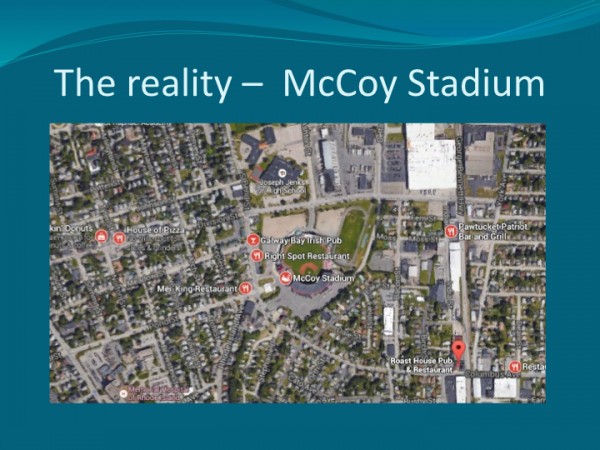 The Providence Foundation‘s report in favor of building a new stadium in downtown Providence for the PawSox reads as a sales pitch for the PawSox owners rather than as a sober economic analysis of the pros and cons of a stadium being built downtown with public funds.
The Providence Foundation‘s report in favor of building a new stadium in downtown Providence for the PawSox reads as a sales pitch for the PawSox owners rather than as a sober economic analysis of the pros and cons of a stadium being built downtown with public funds.
Identified as a “business-backed group” and “an affiliate of the Greater Providence Chamber of Commerce,” The Providence Foundation released this report recommending that “the state, the city, the I-195 Commission and the [PawSox] team owners” come to an agreement and build a new stadium downtown.
Unfortunately, the first third of the report, in which the economic and “catalytic” effects of the proposed ballpark on “real estate development, economic development” and job development, commits egregious methodological errors.
The authors of the report reviewed eight “downtown stadiums” and came to the astounding conclusion that, “in all cases… [the stadiums] have been major factors in the increase of restaurant and retail sales in the area. The facilities have assisted the tourism and convention business and, in some cases, are selling points in the attraction of new companies into the respective cities.”
The stadiums selected for analysis were:
BB&T Ballpark, Charlotte, NC
Chickasaw Ballpark, Oklahoma City, OK
Durham Bulls Athletic Park, Durham, NC
Fifth Third Field, Dayton, OH
Fifth Third Field, Toledo, OH
Huntington Park, Columbus, OH
Regions Field, Birmingham, AL
Southwest University Park, El Paso, TX
No criteria is given as to why these eight stadiums were selected to be reviewed by the report or why dozens, if not hundreds of other sports arenas nationwide were left out. Could this be because the eight stadiums were hand selected by PawSox owners as representing the best eight examples of successful stadium building across the country? I asked Daniel A. Baudouin, executive director of the Providence Foundation for clarification on this point.
“[W]e selected stadiums that were in downtown areas that were constructed/renovated recently and ones that have some geographic diversity” he said in an email to RI Future. “We could have selected more stadiums that were built less recently and as we understand it, have been successes in being a positive force in downtowns (Memphis, Buffalo, Louisville, Norfolk).”
Three of the stadiums included in the report, Durham, El Paso and Toledo, were specifically mentioned by late PawSox owner James Skeffington in conversation with Dan McGowan back in February as models for the proposed Providence stadium. Skeffington mentioned BB&T Ballpark to reporters on April 2 during a tour of the I-195 land. Dayton is mentioned as an model ballpark by Skeffington in this Projo piece. Birmingham is showcased on the Baseball RI site that the PawSox owners are using to sell the idea of a downtown ballpark while Oklahoma is mentioned on the Baseball RI site here.
With all but one of the Providence Foundation’s case studies having been vetted by James Skeffington and the PawSox owners, people who stood to make millions from the proposed ballpark, it’s small wonder that the report was favorable.
Speaker Nicholas Mattiello’s stadium consultant Andrew Zimbalist said in 2009 that, “One should not anticipate that a team or a facility by itself will either increase employment or raise per capita income in a metropolitan area.”
Sports economist Victor Matheson, who spoke at the Blackstone Valley Visitor’s Center on May 13, agreed with Zimbalist. There is, said Matheson, “remarkable agreement among economists finding that spectator sports result in little or no measurable economic benefits on host cities,” said Matheson.
“To your question on overall economic benefits,” said Baudouin, “I will leave that to economists; we did not analyze the macro-economic impact.” That’s a fine distinction to make, except that one of the questions the report was trying to answer is, “Will the stadium be a positive force/catalyst for real estate and economic development in the vicinity of the stadium?” That’s a macroeconomic impact by definition.
In addition to picking only those examples that might prove the case they wanted to make, The Providence Foundation failed to mention the “substitution effect,” described by sports economist Brad Humphreys, in this piece by Melissa Mitchell:
As sport- and stadium-related activities increase, other spending declines because people substitute spending on sports for other spending. If the stadium simply displaces dollar-for-dollar spending that would have occurred otherwise, there are no net benefits generated.”
So how did the Providence Foundation come to such a radically different conclusion from all experts in the field of sports economics?
They cherry picked the data, of course.
Cherry picking, or suppressing evidence, is “the act of pointing to individual cases or data that seem to confirm a particular position, while ignoring a significant portion of related cases or data that may contradict that position.” It’s a well known logical fallacy, but when done intentionally, it is less an error than it is an attempt to deceive.
Whether by accident or design, The Providence Foundation report on a potential downtown Providence ballpark is not of high value, and its issuance calls into question the putative logic behind all the economic positions maintained by The Providence Foundation and the Greater Providence Chamber of Commerce. Both groups regularly lobby state and local legislatures on a host of issues, such as minimum wage and progressive taxation.
It is way past the time to stop seeing the claims “business backed groups” as factually grounded, but to instead recognize them as sophisticated sales pitches.
]]>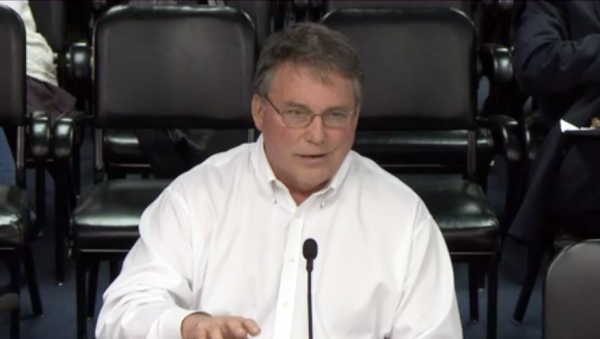
Rep David Bennett’s bill to increase the Rhode Island minimum wage to $10.10 from its current $9 would be the fourth time in four years that the lowest earning Rhode Islanders would see an increase in their pay due to legislative action. Like always, such an increase will not come without a fight.
Last week’s meeting of the House Labor Committee saw five different business lobbying groups send representatives to speak against any increase. During the two hours of testimony, any reason that could be dredged up to oppose increasing the minimum wage was presented – including fear mongering, the citing of questionable studies and downright falsehoods.
Lenette Boisselle, representing the Rhode Island Hospitality Association, suggested that the minimum wage is merely a temporary training wage, and not much used in the state, even though Rep. Bennett just testified that there are 45,000 Rhode Islanders making minimum wage. Boisselle said that we don’t yet know what effects the recently enacted minimum wage increase will have on our state’s economy. Elizabeth Suever, of the Greater Providence Chamber of Commerce, agreed with Boisselle and suggested that the state do a study to determine what the appropriate minimum wage should be.
Bob Bacon, who is the chairman of the RI Hospitality Association and runs Gregg’s Restaurants, a small chain of medium priced eateries, maintained that any increase in the minimum wage will force prices to rise, resulting in no advantage for workers. But what minimum wage advocates should really be worried about, according to Bacon, are robots.
“There’s already massive movement towards technology that will eliminate the need for labor,” said Bacon, “In many restaurants now you have touch pads. Guess what’s next? Pretty soon you’re placing your order on that thing and it’s going to take ten less people to serve you your dinner. And McDonald’s has a system now that one guy at the end of the line starts the burger process and it spits out the other end and they eliminated three people in the middle.”
John Simmons, of the Rhode Island Public Expenditure Council, did Bacon one better. “There’s been some work done, I think, by McDonald’s, as a matter of fact. In particular, on hamburger making. There is some expertise now that they’re drafting up that there will be no person making hamburgers anymore at McDonald’s. It will be all done by machine.”
That workers demanding fair pay will force industry to develop robots has been the refrain from economic conservatives for a while now. The Wall St. Journal ran a piece called “Minimum Wage Backfire” that blamed business automation on minimum wage activists, writing, “The result of their agitation will be more jobs for machines and fewer for the least skilled workers.” Conservative blogs and other media have run with the story, but there’s no truth in it.
As Patrick Thibodeau points out in Computerworld, “The elimination of jobs because of automation will happen anyway.” Some experts think that robots and computers will “replace one third of all workers by 2025.”
Bob Bacon must know this.
Gregg’s Restaurants is a pioneer in the computerization of restaurants. Most of the millions made by Bill and Ted Fuller, owners of the small chain, has come from POSitouch, “the food service industry’s most feature rich POS system.” I’ve heard rumors that the entire Gregg’s Restaurant chain is a loss leader, maintained to demonstrate the POSitouch system to interested buyers.
If robots were able to do the work needed to replace people in restaurants, POSitouch would be in a position to know. The information Bacon and Simmons presented about the hamburger machine is probably untrue, because if the technology existed to automate the burger making process, McDonald’s would already be using it. Instead, McDonald’s is investing in ordering kiosks, like ATMs in banks or the self-checkout machines at supermarkets. And it’s doubtful that these kiosks could be prevented if the employees agreed to work for less money.
How can any worker live on less than it takes to maintain an iPad?
John Simmons made the additional point that an increase in the minimum wage is basically unnecessary because, if you are on minimum wage then “you are probably getting earned income tax credits, you’re getting Medicare, you’re getting all the social programs which are allowing you to offset all the inflationary issues because you’re not paying for them anymore.”
That’s true. Low wage workers are not paying for all this government assistance. Taxpayers are. Rep Bennett testified that Walmart has nine locations in Rhode Island and pays $9 an hour. Their revenue is $476.3 billion. Rhode Island subsidizes Walmart’s labor costs through social services. Raising the minimum wage would force Walmart to pay its own labor costs, and allow more people to live without government assistance.
This could go a long way towards Speaker Nicholas Mattiello’s dream of a world without a social safety net.
Some legislators helped those speaking against the minimum wage with their testimony by lobbing out leading questions, as evidenced by this exchange between Republican Representative Antonio Giarusso and Bob Bacon:
“What is minimum wage?” asked Giarusso, “Is it a living wage, is it somebody just getting out of school, making their way, trying to learn the ropes? Not to put you on the spot, but of all your employees, how many of them are making a minimum wage or something really close to it and are the breadwinners in their households?”
“The breadwinners?” asked Bacon before answering, “Zero.” Two which Giarrusso said with satisfaction, “I thought that would be the answer.”
Penelope Kyritsis, representing RI National Organization for Women, said that approximately 60% of minimum wage workers are women, based on a a report from the National Women’s Law Center. Most of these women have children and no spouse to rely on, meaning that they are the main breadwinners in their family.
A typical minimum wage worker, according to Kyritsis, contrary to popular belief, is not a teenager. The average age of a minimum wage worker is 35, according to the United States Department of Labor, and 88% are at least 20 years old.
A full report on the benefits of raising the minimum wage in Rhode Island to $10.10 can be found here. It should be noted that a single person with no children needs to make $11.86 an hour, to not be in poverty.
If there are any doubts about the cozy relationship between our General Assembly and the business interests in Rhode Island, there’s this exchange I’ve reproduced in comics form.
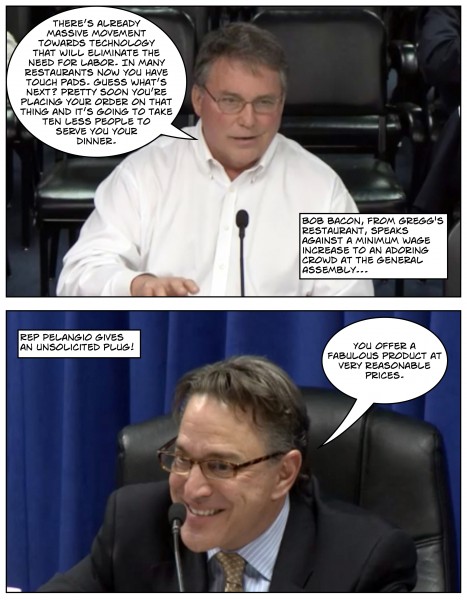
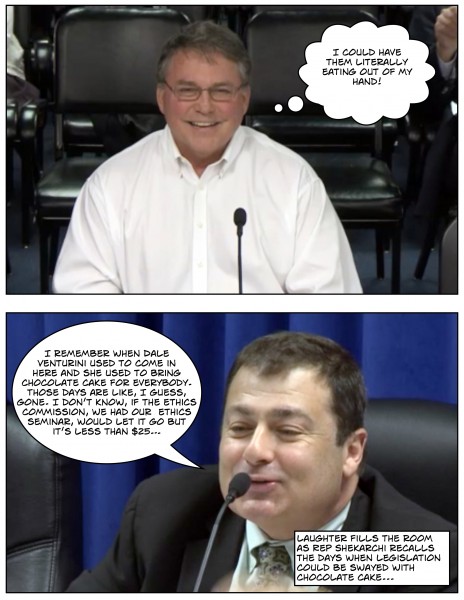
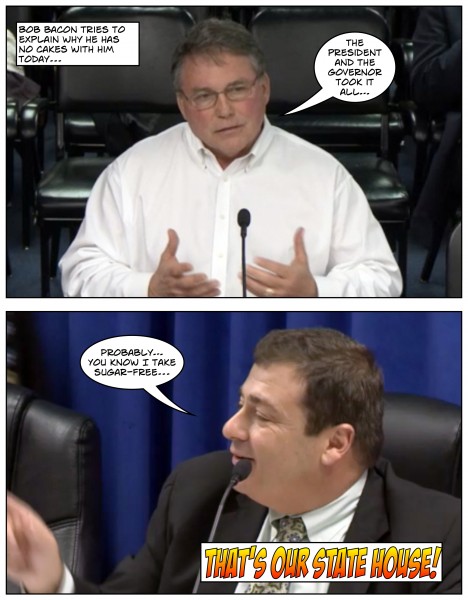
Right now, business owners and lobbyists have the reigns of the State House. They are pursuing an economic agenda that has only benefited those at the top and almost never those who struggle at the margins.
If low wage workers want fair treatment at the State House, they have to organize and demand it.
]]>